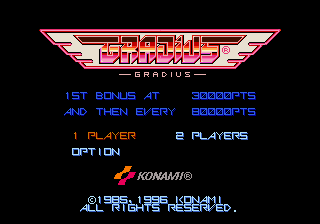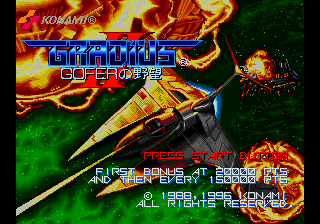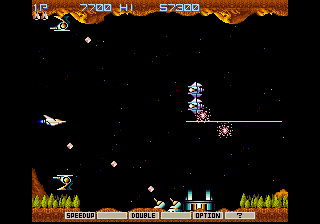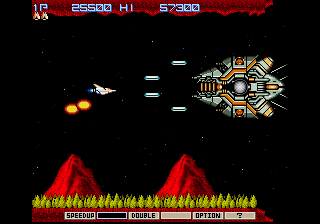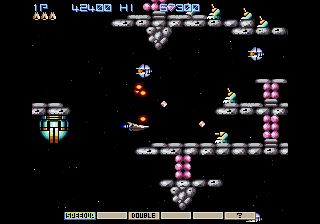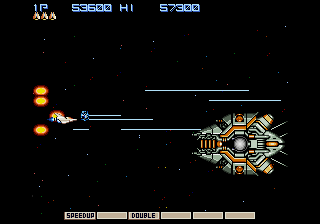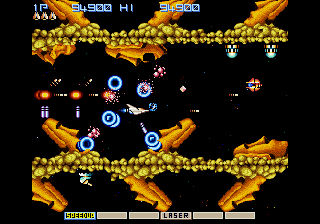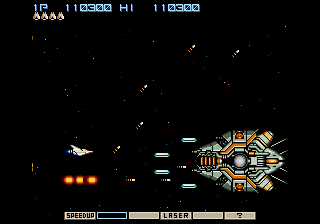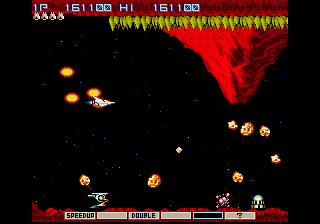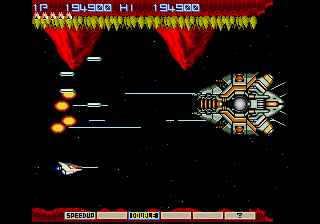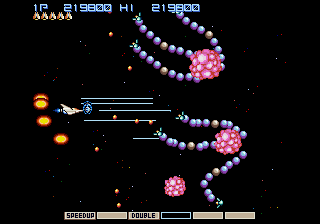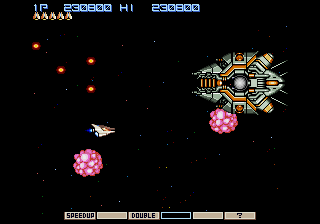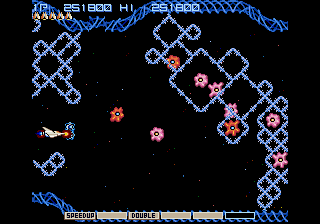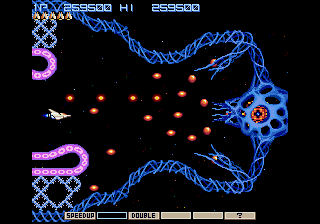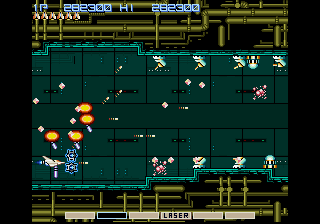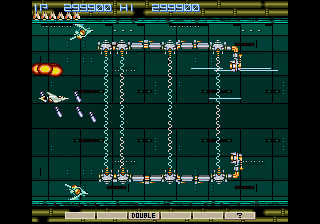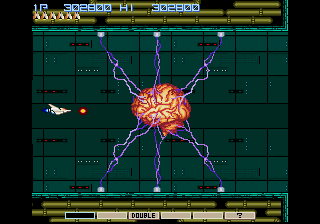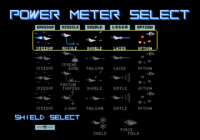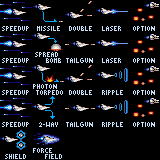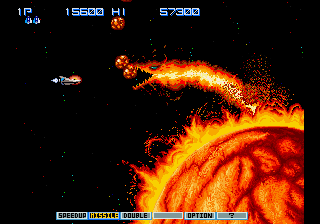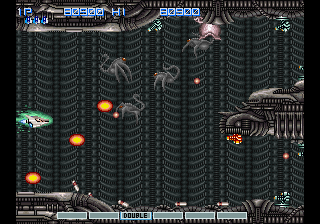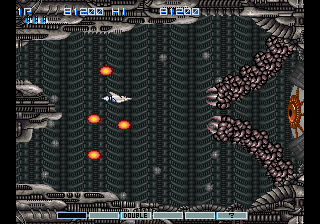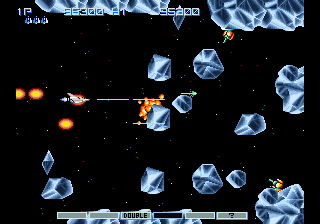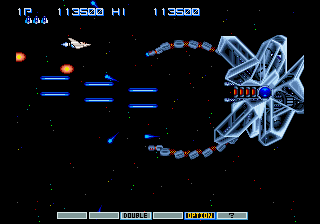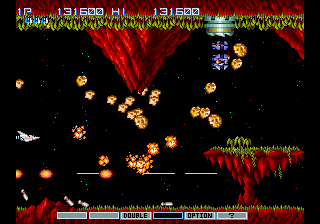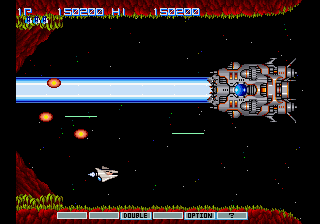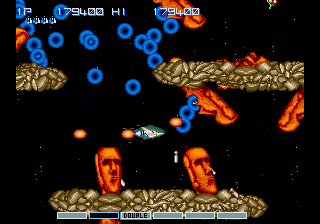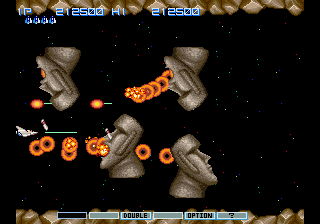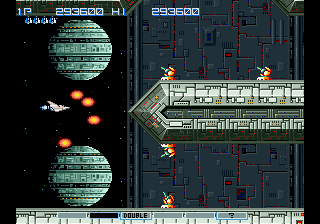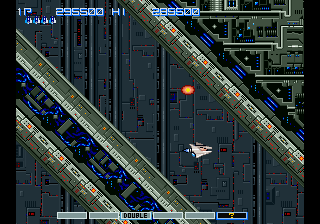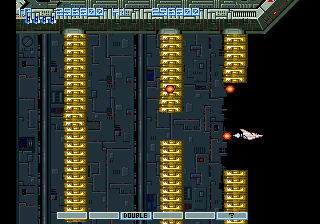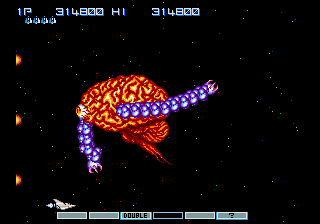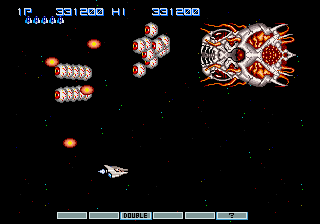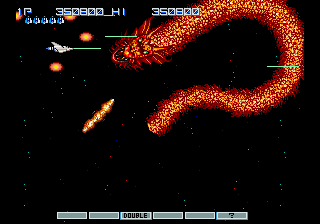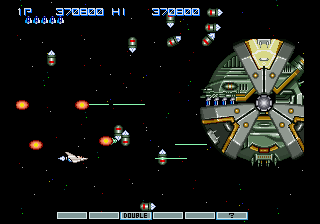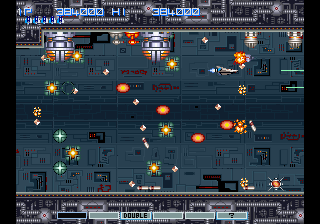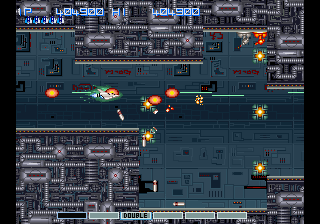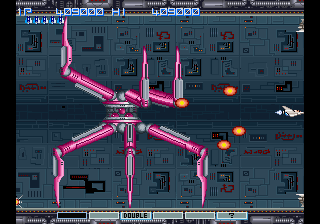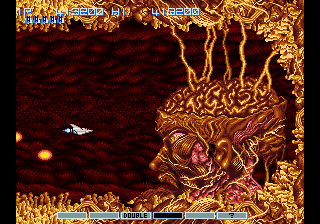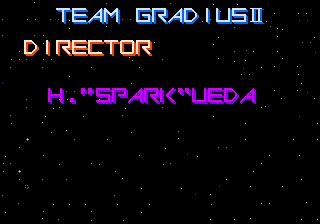Difference between revisions of "Gradius Deluxe Pack"
From Sega Retro
| (3 intermediate revisions by 2 users not shown) | |||
| Line 24: | Line 24: | ||
|SAT|internal | |SAT|internal | ||
}} | }} | ||
| + | | properties={{Properties|SAT|pccontent}} | ||
}} | }} | ||
'''''{{PAGENAME}}''''' (グラディウス DELUXE PACK) is a compilation containing ''Gradius'' and ''Gradius II'', two arcade shoot-'em-ups developed and published by [[Konami]], for the [[Sega Saturn]]. It is the only licensed ''[[:Category:Gradius|Gradius]]'' release on a [[Sega]] system (though the spin-off games ''[[Salamander Deluxe Pack Plus|Salamander]]'' and ''[[Parodius]]'' were also released on the Saturn). It was only released in Japan. The games are identical to their arcade counterparts, bar a few touch-ups. | '''''{{PAGENAME}}''''' (グラディウス DELUXE PACK) is a compilation containing ''Gradius'' and ''Gradius II'', two arcade shoot-'em-ups developed and published by [[Konami]], for the [[Sega Saturn]]. It is the only licensed ''[[:Category:Gradius|Gradius]]'' release on a [[Sega]] system (though the spin-off games ''[[Salamander Deluxe Pack Plus|Salamander]]'' and ''[[Parodius]]'' were also released on the Saturn). It was only released in Japan. The games are identical to their arcade counterparts, bar a few touch-ups. | ||
| Line 42: | Line 43: | ||
''Gradius'' is a side-scrolling shoot-'em-up game, originally released to arcades in 1985. The player pilots a trans-dimensional spacecraft known as the Vic Viper in order to defend the mother planet Gradius from alien invaders. It was a seminal release for the shoot-'em-up genre, and it pioneered a number of features and mechanics that would become hallmarks of the genre, including multiple themed stages, "option" drones that follow the ship and provide support fire, and a novel power-up system for upgrading the ship's weaponry. There are six stages, each preceded by a short space section with waves of easy enemies that can be destroyed to collect power-ups. The game can be played by one player or by two players taking turns. | ''Gradius'' is a side-scrolling shoot-'em-up game, originally released to arcades in 1985. The player pilots a trans-dimensional spacecraft known as the Vic Viper in order to defend the mother planet Gradius from alien invaders. It was a seminal release for the shoot-'em-up genre, and it pioneered a number of features and mechanics that would become hallmarks of the genre, including multiple themed stages, "option" drones that follow the ship and provide support fire, and a novel power-up system for upgrading the ship's weaponry. There are six stages, each preceded by a short space section with waves of easy enemies that can be destroyed to collect power-ups. The game can be played by one player or by two players taking turns. | ||
| − | The Vic Viper can be moved in any direction using the D-Pad. Some stages are taller than the visible area and scroll vertically when the ship flies near an edge. The ship shoots with {{B}} (or {{Y}} for rapid-fire). The main weapon can be upgraded to the Double, which adds an upward-angled second stream of fire, or the Laser, which shoots long lasers that pierce through multiple targets. All weapons can neutralize enemy fire. Players can obtain an upgrade that augments the ship's main weapon with missiles, which are dropped below the ship by pressing {{C}} (or {{Z}} for rapid-fire). The ship can additionally collect up to four options that follow it and replicate its fire. Options spread out when the ship moves away from them but | + | The Vic Viper can be moved in any direction using the D-Pad. Some stages are taller than the visible area and scroll vertically when the ship flies near an edge. The ship shoots with {{B}} (or {{Y}} for rapid-fire). The main weapon can be upgraded to the Double, which adds an upward-angled second stream of fire, or the Laser, which shoots long lasers that pierce through multiple targets. All weapons can neutralize enemy fire. Players can obtain an upgrade that augments the ship's main weapon with missiles, which are dropped below the ship by pressing {{C}} (or {{Z}} for rapid-fire). The ship can additionally collect up to four options that follow it and replicate its fire. Options spread out when the ship moves away from them but can be clumped together by moving in alternating directions, giving the player the ability to cover a wide area with them or focus their fire. |
There is only one item to collect, which advances the "power meter" by one position. The player can select the desired upgrade when it is highlighted in the power meter by pressing {{A}} or {{X}}, which resets the meter. Each upgrade can only be selected a certain number of times, after which it is no longer available (though it leaves a blank space that must still be advanced through to reach any upgrades after it). This system allows the player to strategize which upgrades to prioritize, with the most powerful upgrades requiring the most items to unlock. | There is only one item to collect, which advances the "power meter" by one position. The player can select the desired upgrade when it is highlighted in the power meter by pressing {{A}} or {{X}}, which resets the meter. Each upgrade can only be selected a certain number of times, after which it is no longer available (though it leaves a blank space that must still be advanced through to reach any upgrades after it). This system allows the player to strategize which upgrades to prioritize, with the most powerful upgrades requiring the most items to unlock. | ||
| Line 164: | Line 165: | ||
''Gradius II'' is the sequel to ''Gradius'', originally released to arcades in 1988 (following the release of the spin-off ''[[Salamander Deluxe Pack Plus|Salamander]]'' in 1986). The player returns to pilot the Vic Viper spaceship and counter the second onslaught of the Bacterian Empire. The game retains the power meter from the first game, but the player now chooses between four different weapon configurations and two kinds of shielding before starting the game. It also introduces two new types of stage that would be revisited in sequels: the "speed stage," where the game scrolls faster and the Vic Viper must navigate a tight maze (similar to the escape sequence at the end of ''Salamander''), and the "boss rush" stage, where the player fights multiple bosses in a row. The game can be played by one player or by two players taking turns. | ''Gradius II'' is the sequel to ''Gradius'', originally released to arcades in 1988 (following the release of the spin-off ''[[Salamander Deluxe Pack Plus|Salamander]]'' in 1986). The player returns to pilot the Vic Viper spaceship and counter the second onslaught of the Bacterian Empire. The game retains the power meter from the first game, but the player now chooses between four different weapon configurations and two kinds of shielding before starting the game. It also introduces two new types of stage that would be revisited in sequels: the "speed stage," where the game scrolls faster and the Vic Viper must navigate a tight maze (similar to the escape sequence at the end of ''Salamander''), and the "boss rush" stage, where the player fights multiple bosses in a row. The game can be played by one player or by two players taking turns. | ||
| − | The Vic Viper can be moved in any direction using the D-Pad. Some stages are taller than the visible area and scroll vertically when the ship flies near an edge. The ship shoots with {{B}} (or {{Y}} for rapid-fire). Each weapon load-out contains two mutually exclusive weapon upgrades: one "Double" type that adds a second stream of bullets, and one "Laser" type that fires a more powerful beam. All weapons can neutralize enemy fire. Players can also select an upgrade that augments the ship's main weapon with a secondary weapon that can be fired simultaneously with {{C}} (or {{Z}} for rapid-fire). The ship can additionally collect up to four options that follow it and replicate its fire. Options spread out when the ship moves away from them but | + | The Vic Viper can be moved in any direction using the D-Pad. Some stages are taller than the visible area and scroll vertically when the ship flies near an edge. The ship shoots with {{B}} (or {{Y}} for rapid-fire). Each weapon load-out contains two mutually exclusive weapon upgrades: one "Double" type that adds a second stream of bullets, and one "Laser" type that fires a more powerful beam. All weapons can neutralize enemy fire. Players can also select an upgrade that augments the ship's main weapon with a secondary weapon that can be fired simultaneously with {{C}} (or {{Z}} for rapid-fire). The ship can additionally collect up to four options that follow it and replicate its fire. Options spread out when the ship moves away from them but can be clumped together by moving in alternating directions, giving the player the ability to cover a wide area with them or focus their fire. There is a new enemy called the "Option Hunter" that is capable of stealing the ship's options. |
There is only one item to collect, which advances the "power meter" by one position. The player can select the desired upgrade when it is highlighted in the power meter by pressing {{A}} or {{X}}, which resets the meter. Each upgrade can only be selected a certain number of times, after which it is no longer available (though it leaves a blank space that must still be advanced through to reach any upgrades after it). This system allows the player to strategize which upgrades to prioritize, with the most powerful upgrades requiring the most items to unlock. | There is only one item to collect, which advances the "power meter" by one position. The player can select the desired upgrade when it is highlighted in the power meter by pressing {{A}} or {{X}}, which resets the meter. Each upgrade can only be selected a certain number of times, after which it is no longer available (though it leaves a blank space that must still be advanced through to reach any upgrades after it). This system allows the player to strategize which upgrades to prioritize, with the most powerful upgrades requiring the most items to unlock. | ||
| Line 384: | Line 385: | ||
==Technical information== | ==Technical information== | ||
{{mainArticle|{{PAGENAME}}/Technical information}} | {{mainArticle|{{PAGENAME}}/Technical information}} | ||
| − | |||
| − | |||
| − | |||
| − | |||
==References== | ==References== | ||
Latest revision as of 03:51, 18 September 2024
| ||||||||||
| Gradius Deluxe Pack | ||||||||||
|---|---|---|---|---|---|---|---|---|---|---|
| System(s): Sega Saturn | ||||||||||
| Publisher: Konami | ||||||||||
| Developer: Konami | ||||||||||
| Original system(s): Arcade boards | ||||||||||
| Game total: 2 | ||||||||||
| Genre: Compilation, Shooting[1][2] | ||||||||||
| Number of players: 1-2 | ||||||||||
| ||||||||||
|
Gradius Deluxe Pack (グラディウス DELUXE PACK) is a compilation containing Gradius and Gradius II, two arcade shoot-'em-ups developed and published by Konami, for the Sega Saturn. It is the only licensed Gradius release on a Sega system (though the spin-off games Salamander and Parodius were also released on the Saturn). It was only released in Japan. The games are identical to their arcade counterparts, bar a few touch-ups.
Contents
Games included
- Gradius
- Gradius II
Story
Gradius
The Earth-like planet Gradius is under attack by the evil Bacterian Empire, a race of amoeba-like beings from a sub-space cluster. Gradius is on the brink of extinction due to the fierce attack and has decided to launch its last resort, the hyper-space fighter Vic Viper. The only way to put an end to the battle is to fight to the middle of the enemy's massive base in Zelos and destroy its core.
Gradius II
Two years after the Vic Viper succeeded in destroying Zelos, the Bacterians, now under the leadership of the giant head Gofer, have once again attacked the planet Gradius.
Gameplay
Gradius
Gradius is a side-scrolling shoot-'em-up game, originally released to arcades in 1985. The player pilots a trans-dimensional spacecraft known as the Vic Viper in order to defend the mother planet Gradius from alien invaders. It was a seminal release for the shoot-'em-up genre, and it pioneered a number of features and mechanics that would become hallmarks of the genre, including multiple themed stages, "option" drones that follow the ship and provide support fire, and a novel power-up system for upgrading the ship's weaponry. There are six stages, each preceded by a short space section with waves of easy enemies that can be destroyed to collect power-ups. The game can be played by one player or by two players taking turns.
The Vic Viper can be moved in any direction using the D-Pad. Some stages are taller than the visible area and scroll vertically when the ship flies near an edge. The ship shoots with ![]() (or
(or ![]() for rapid-fire). The main weapon can be upgraded to the Double, which adds an upward-angled second stream of fire, or the Laser, which shoots long lasers that pierce through multiple targets. All weapons can neutralize enemy fire. Players can obtain an upgrade that augments the ship's main weapon with missiles, which are dropped below the ship by pressing
for rapid-fire). The main weapon can be upgraded to the Double, which adds an upward-angled second stream of fire, or the Laser, which shoots long lasers that pierce through multiple targets. All weapons can neutralize enemy fire. Players can obtain an upgrade that augments the ship's main weapon with missiles, which are dropped below the ship by pressing ![]() (or
(or ![]() for rapid-fire). The ship can additionally collect up to four options that follow it and replicate its fire. Options spread out when the ship moves away from them but can be clumped together by moving in alternating directions, giving the player the ability to cover a wide area with them or focus their fire.
for rapid-fire). The ship can additionally collect up to four options that follow it and replicate its fire. Options spread out when the ship moves away from them but can be clumped together by moving in alternating directions, giving the player the ability to cover a wide area with them or focus their fire.
There is only one item to collect, which advances the "power meter" by one position. The player can select the desired upgrade when it is highlighted in the power meter by pressing ![]() or
or ![]() , which resets the meter. Each upgrade can only be selected a certain number of times, after which it is no longer available (though it leaves a blank space that must still be advanced through to reach any upgrades after it). This system allows the player to strategize which upgrades to prioritize, with the most powerful upgrades requiring the most items to unlock.
, which resets the meter. Each upgrade can only be selected a certain number of times, after which it is no longer available (though it leaves a blank space that must still be advanced through to reach any upgrades after it). This system allows the player to strategize which upgrades to prioritize, with the most powerful upgrades requiring the most items to unlock.
The ship is destroyed if it takes a single hit from an enemy or collides with terrain. All power-ups are lost when the ship is destroyed. If the player has extra lives remaining, the ship restarts at a predetermined checkpoint, which gives the player an opportunity to collect more power-ups and upgrade the ship again. The game ends if the ship is destroyed and the player has no lives remaining, and there are no continues. Extends are given at 30,000 points and every 80,000 points after that, and players can set the number of starting lives from the options (between 1 and 7) before starting the game. After finishing the game, it loops from the beginning at a higher difficulty. There are six difficulty levels (Saturn Easy, Easy, Normal, Difficult, Very Difficult, and Saturn Difficult). There is also an option to stretch the image to fit the width of the screen.
Items
Items are dropped by reddish-colored enemies when they are destroyed or when an entire wave of enemies is destroyed.
| Red Power Capsule | |
|---|---|
| Advances the power meter by one position. | |
| Blue Power Capsule | |
| Destroys all on-screen enemies when collected. This item appears after every 15 Red Power Capsules. |
Power meter
The power meter contains the following power-ups:
| Speed Up | |
|---|---|
| Increases the movement speed of the ship, up to 5 levels. | |
| Missile | |
| Allows the ship to drop missiles in a downward arc concurrently with its main weapon. Missiles slide along terrain. | |
| Double | |
| Adds a second shot to the main weapon that shoots 45 degrees upwards. This selection and the Laser are mutually exclusive. | |
| Laser | |
| Changes the main weapon to long, piercing lasers. This selection and the Double are mutually exclusive. | |
| Option | |
| Creates an orange orb that follows the ship and replicates its fire (including dropping missiles). The ship can have up to 4 options following it. | |
| ? | |
| Creates two shields that protect the front of the ship from multiple hits. |
Stages
| 火山ステージ (Volcano Stage) | |
|---|---|
| ストーンヘンジステージ (Stonehenge Stage) | |
| モアイステージ (Moai Stage) | |
| 逆火山ステージ (Reverse Volcano Stage) | |
| 触手ステージ (Tentacle Stage) | |
| 特殊細胞ステージ (Special Cell Stage) | |
| ゼロス要基ステージ (Zelos Fortress Stage) | |
Gradius II
Gradius II is the sequel to Gradius, originally released to arcades in 1988 (following the release of the spin-off Salamander in 1986). The player returns to pilot the Vic Viper spaceship and counter the second onslaught of the Bacterian Empire. The game retains the power meter from the first game, but the player now chooses between four different weapon configurations and two kinds of shielding before starting the game. It also introduces two new types of stage that would be revisited in sequels: the "speed stage," where the game scrolls faster and the Vic Viper must navigate a tight maze (similar to the escape sequence at the end of Salamander), and the "boss rush" stage, where the player fights multiple bosses in a row. The game can be played by one player or by two players taking turns.
The Vic Viper can be moved in any direction using the D-Pad. Some stages are taller than the visible area and scroll vertically when the ship flies near an edge. The ship shoots with ![]() (or
(or ![]() for rapid-fire). Each weapon load-out contains two mutually exclusive weapon upgrades: one "Double" type that adds a second stream of bullets, and one "Laser" type that fires a more powerful beam. All weapons can neutralize enemy fire. Players can also select an upgrade that augments the ship's main weapon with a secondary weapon that can be fired simultaneously with
for rapid-fire). Each weapon load-out contains two mutually exclusive weapon upgrades: one "Double" type that adds a second stream of bullets, and one "Laser" type that fires a more powerful beam. All weapons can neutralize enemy fire. Players can also select an upgrade that augments the ship's main weapon with a secondary weapon that can be fired simultaneously with ![]() (or
(or ![]() for rapid-fire). The ship can additionally collect up to four options that follow it and replicate its fire. Options spread out when the ship moves away from them but can be clumped together by moving in alternating directions, giving the player the ability to cover a wide area with them or focus their fire. There is a new enemy called the "Option Hunter" that is capable of stealing the ship's options.
for rapid-fire). The ship can additionally collect up to four options that follow it and replicate its fire. Options spread out when the ship moves away from them but can be clumped together by moving in alternating directions, giving the player the ability to cover a wide area with them or focus their fire. There is a new enemy called the "Option Hunter" that is capable of stealing the ship's options.
There is only one item to collect, which advances the "power meter" by one position. The player can select the desired upgrade when it is highlighted in the power meter by pressing ![]() or
or ![]() , which resets the meter. Each upgrade can only be selected a certain number of times, after which it is no longer available (though it leaves a blank space that must still be advanced through to reach any upgrades after it). This system allows the player to strategize which upgrades to prioritize, with the most powerful upgrades requiring the most items to unlock.
, which resets the meter. Each upgrade can only be selected a certain number of times, after which it is no longer available (though it leaves a blank space that must still be advanced through to reach any upgrades after it). This system allows the player to strategize which upgrades to prioritize, with the most powerful upgrades requiring the most items to unlock.
The ship is destroyed if it takes a single hit from an enemy or collides with terrain. All power-ups are lost when the ship is destroyed. If the player has extra lives remaining, the ship restarts at a predetermined checkpoint, which gives the player an opportunity to collect more power-ups and upgrade the ship again. The game ends if the ship is destroyed and the player has no lives remaining. There are no continues, but they can be enabled in the options. Extends are given at 20,000 points and every 150,000 points after that, and players can set the number of starting lives from the options (between 2 and 7) before starting the game. After finishing the game, it loops from the beginning at a higher difficulty. There are six difficulty levels (Saturn Easy, Easy, Normal, Difficult, Very Difficult, and Saturn Difficult). There is also an option to stretch the image to fit the width of the screen.
Items
Items are dropped by reddish-colored enemies when they are destroyed or when an entire wave of enemies is destroyed.
| Red Power Capsule | |
|---|---|
| Advances the power meter by one position. | |
| Blue Power Capsule | |
| Destroys all on-screen enemies when collected. This item appears after every 12 Red Power Capsules. |
Power meter
Upgrades
The player can choose from four weapon load-outs. All of them contain Speed Up, which increases the movement speed of the ship (up to 5 levels), and Option, which creates an orange orb that follows the ship and replicates its fire (up to 4 options). The Double and Laser power-ups are mutually exclusive upgrades to the main weapon; choosing one removes the other if equipped, but the player can switch freely between them throughout the game.
| Description | |||||
|---|---|---|---|---|---|
This is the same weapon load-out as the original Gradius.
| |||||
This load-out that can do high damage with its bombs but has relatively scant coverage and requires more precise control to use.
| |||||
This load-out covers a large area with its main weapons, though its torpedoes are trickier to target effectively.
| |||||
This load-out incorporates the 2-Way missiles and the Ripple Laser from Salamander.
|
Shields
The player can select one of two shielding types, independently from the weapon load-out, which are activated by choosing ? from the power meter.
| Shield | |
|---|---|
| Creates two shields that protect the front of the ship and can withstand 15 hits. | |
| Force Field | |
| Ensconces the ship in a protective barrier that protects it in all directions and can withstand 3 hits. |
Stages
| 人工太陽ステージ (Artificial Sun Stage) | |
|---|---|
| エイリアンステージ (Alien Stage) | |
| 結晶ステージ (Crystal Stage) | |
| 火山ステージ (Volcano Stage) | |
| リベンジ・オブ・モアイステージ (Revenge of Moai Stage) | |
| 高速迷路ステージ (High-Speed Maze Stage) | |
| ボス・オンパレードステージ (Boss Rush Stage) | |
| 要基ステージ (Key Stage) | |
Production credits
Gradius
- Director: H."Spark"Ueda
- Program: H."Spark"Ueda, Ryo Sonoba, Takayuki Kobayashi, Nayami Naizo-, 38, Kei Chigasaki
- Graphic: INU, K-9
- Sound: Kiyohiko Yamane, AKT, NOR, Akira Yamaoka
- Op.Movie Bgm: Motoaki Furukawa
- Staff Roll Bgm: Miki Higashino
- Op.Movie Design: Reiko Hagiwara, Yukito Komori, M.Shiraishi, Takashi Mizutani, H.Funauchi
- Package Design: A.Karibe
- Special Thanks: Gradius Arcade Original Team, SS Bug Checkers
- Producer: Kazumi Kitaue
- Supervisor: Halky
- Presented by: Konami®
Gradius II
- Director: H."Spark"Ueda
- Game Programmer: 38, M.Fururu, Kei Chigasaki, H."Spark"Ueda, Ryo Sonoba, T.Kobayashi
- Graphic Designer: INU, K-9
- Sound Editor: Kiyohiko Yamane, AKT, NOR, Akira Yamaoka
- Title Music: Motoaki Furukawa
- Visual Designer: Reiko Hagiwara, Yukiko Komori, T.Mizutani, M.Shiraishi, H.Funauchi
- Package Designer: A.Karibe
- Special Thanks: Gradiusii Arcade Team, SS Bug Checkers
- Supervisor: Halky
- Producer: Kazumi Kitaue
- Presented by: Konami®
Magazine articles
- Main article: Gradius Deluxe Pack/Magazine articles.
Physical scans
| Sega Retro Average | ||||||||||||||||||||||||||||||||||||||||||||||||||||||||||||||||
|---|---|---|---|---|---|---|---|---|---|---|---|---|---|---|---|---|---|---|---|---|---|---|---|---|---|---|---|---|---|---|---|---|---|---|---|---|---|---|---|---|---|---|---|---|---|---|---|---|---|---|---|---|---|---|---|---|---|---|---|---|---|---|---|---|
|
| 68 | |
|---|---|
| Based on 12 reviews | |
Technical information
- Main article: Gradius Deluxe Pack/Technical information.
References
NEC Retro has more information related to Gradius
|
NEC Retro has more information related to Gradius II: Gofer no Yabou
|
- ↑ File:GradiusDeluxePack Saturn JP Box Back.jpg
- ↑ 2.0 2.1 https://sega.jp/fb/segahard/ss/soft_licensee2.html (Wayback Machine: 2019-10-02 10:31)
- ↑ File:Gradius Deluxe Pack, Gradius Saturn credits.pdf
- ↑ File:Gradius Deluxe Pack, Gradius II Saturn credits.pdf
- ↑ Consoles +, "Mai 1996" (FR; 1996-0x-xx), page 128
- ↑ Famitsu, "1996-04-05" (JP; 1996-03-22), page 1
- ↑ Fun Generation, "06/96" (DE; 1996-05-08), page 60
- ↑ GameFan, "Volume 4, Issue 6: June 1996" (US; 1996-xx-xx), page 18
- ↑ Joypad, "Juillet/Août 1996" (FR; 1996-0x-xx), page 70
- ↑ MAN!AC, "06/96" (DE; 1996-05-08), page 44
- ↑ Mega Force, "Mai 1996" (FR; 1996-0x-xx), page 41
- ↑ Mega Fun, "06/96" (DE; 1996-05-15), page 77
- ↑ Saturn Fan, "1996 No. 12" (JP; 1996-05-24), page 70
- ↑ Sega Saturn Magazine, "1996-06 (1996-04-12)" (JP; 1996-03-22), page 232
- ↑ Sega Saturn Magazine, "Readers rating final data" (JP; 2000-03), page 11
- ↑ Video Games, "6/96" (DE; 1996-05-29), page 94
| Gradius Deluxe Pack | |
|---|---|
|
Main page | Comparisons | Hidden content | Magazine articles | Reception | Technical information | |
| Gradius / Parodius games for Sega systems | |
|---|---|
| Nemesis (1987) | Nemesis 2 (1987) | |
| Gradius Deluxe Pack (1996) | Salamander Deluxe Pack Plus (1997) | Konami Antiques MSX Collection Ultra Pack (1998) | |
| Parodius (1995) | Sexy Parodius (1996) | Jikkyou Oshaberi Parodius: Forever With Me (1996) | |

